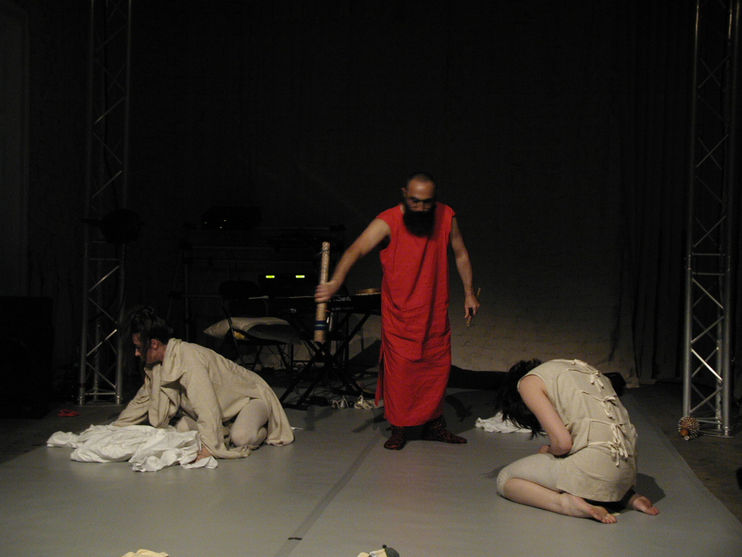


ORGASM
essay by Vlad Zografi
In a madhouse, instead of the usual treatment, the patients receive their daily MUSIC.
The doctor (Harry Tavitian), sometimes wizard, sometimes shaman, is playing his therapy at piano, flute, and exotic instruments. Can music cure the disease that touches all of us, more or less?
“Orgasm” has been presented for the first time at the “West Oestlicher Diwan” Festival, Halle (Germany), on 12th of May 2001.



Toaca Foundation
MAY 2001
Concept and Directing
Nona Ciobanu
Music (live)
Harry Tavitian
Costume & lighting design
Ana Olteanu
Choreography
Laurenţia Barbu
Foto Gallery

Cast
Liliana Pană
patient 1
Laurenţia Barbu
patient 2
Harry Tavitian
doctor
Awards
Reviews
The show was essentially an invitation to freedom. The arts - theatre, music and dance, collaborated in bringing forth a deep-seated humanity, witch is usually confined behind the curtain of words of conventional theatre. In theatre, as in art in general, pluralism depends on the success of attempts such as this one of Nona
Ciobanu, Vlad Zografi, Harry Tavitian, Liliana Pana, Laurentia Barbu and Ana Olteanu.
Nicolae Prelipceanu, Toaca - A Project for the 21st Century
(Romania Libera - June 2001)
Directed by Nona Ciobanu, known not only to Romanian but also to European audiences, winner of several awards for shows produced in Romania, Germany and Malta, ' Orgasm ' premiered and received a standing ovation at the West Ostlicher Diwan Theatre Festival, in Halle, Germany. Against the set and light design of Ana Olteanu, two ' patients' - the actress Liliana Pana and the dancer and choreographer Laurentia Barbu, recount the history of their afflictions. The doctor, sometimes a medicine man, at other times a shaman, is a believer in music therapy, using the piano, the flute and exotic instruments to restore the patients back to health. Do not miss this acutely metaphoric and modern show at the Toaca Studio.
Victoria Anghelescu,
Theatrical Metaphors
(Curentul - June 2001)
The finely tuned performance of the actors is enhanced by the fascinating music, the skillful lightning and, last but not least, the closed space, sealed off from the outside world: the psychiatric ward becomes a metaphor for the space of our everyday lives, where solutions can only be found together. With or without
make-up or masturbation - the two images around which Zografi's theme is organised. Nona Ciobanu's achievement matches the challenge of the text: tension, high-pitched movement, a good balance between parts. Everything sets the tone for the question: What will become of us? Between a 'cuckoo's nest' and a 'concentration camp', private obsessions magnify into collective traumas. Especially in the 20th century, after Freud, Jung and Adler, but also after nazism and communism, oscillating between the freedoms affronted by the post-industrial society and the norms imposed by various religions, sexuality is an unavoidable topic.
'Orgasm' thematizes it as individual and collective obsession.
Florian Baiculescu,
In Intensive Care
(Observatorul cultural - Cultural Observer - June 2001)
After seeing 'Orgasm', based on a text by Vlad Zografi and directed by Nona Ciobanu, one of the most talented directors of the new generation, you feel like saying to yourself: 'Finally, we have the freedom of calling things by their names!' A fictitious freedom, as the text is much more intricate then that. The two female characters - one, played by Liliana Pana, drowned in the frustration of unrequited love; the other, speechless but kept in perpetual movement by choreographer Laurentia Barbu -, are perhaps the patients of a psychiatric ward, or maybe the dual image of the woman in a failed sexual encounter. Or, if we were to follow the words of the author, Vlad Zografi, they represent the crisis that the theatrical message is undergoing, in front of a stage on which the real tragedy of a sick society unfolds. The attempt to overcome
this short-circuit through music is bound to fail eventually. The doctor-cum-medicine men-cum-shaman played with remarkable acumen by the jazz musician Harry Tavitian, gives up. Music bypasses the dullness of words but is finally unable to alleviate the pain of the world, enmeshed in its failures. To quote a line from Vlad Zografi's text, 'You don't need make-up to masturbate'. ' Orgasm' is a daring experiment, a cruel and ironic X-ray view of a crisis in artistic expression.
Florin Toma,
The Zography of the World
(Ziua - June 2001)
Far from being dryly didactic, the monologue tells the story of a couple in a profound crisis. Two people, or- on another level, the man representing society and the woman, theatre-, have drifted apart, losing whatever attraction was keeping them together. It is impossible to tell which one of them carries the virus of boredom, of absence, of inadequacy. The therapy attempted in the show is music, sometimes tranquil and appeasing, at other times aggressive and full of intimidation. The dominant feeling is ambiguity, deriving
from the strange, confusing relation between cause and effect. Words, gestures, tonalities trigger disquieting
overreactions. The structure of the show obeys this sort of reversed harmony. The three voices complement each other and diffract. The succession and overlapping of their perspective rhythms question theatrical conventions. The actor, the dancer and the musician retain the individuality of voice, even when coming together in a chorus or in a masterful duet. They sometimes cross over, exchanging discourses, and the performance is outstanding. These transfers enhance the semantic multiplicity subtly delineated in Ana
Olteanu’s set design. The show collapses different art forms. Refreshing and innovative, “Orgasm” opens up a new path in Nona Ciobanu’s artistic project, one only hinted at in “Tuscany” and perhaps informed by her experience as a manager of the Toaca Cultural Foundation.
Eugenia Anca Rotescu,
A Crisis in the Marriage of Theatre and Society, (Observatorul Cultural - The Cultural Observer, August 2001)
Nona Ciobanu’s show speaks about Absence. The woman-as-a-theatre, the man-as-a-society and the public become the subjects of a painstaking psychiatric “therapy”, behind closed doors.
Music is an omnipotent character, its creator- a consummate actor. Psychoanalysis gone astray, sexuality as surface of communication. Nona Ciobanu imagines a simple and straightforward, yet effective dialogue about our need of harm ony. And the public cannot evade this question: each spectator has to formulate an answer. The public is integrated in the performance, so that the spectator becomes the spectator of spectators.
The decoy in this game, which jolts the audience into awareness and establishes the dialogue, is the heroin, whose story comes about as an interplay of Th characters. In the end, it seems that the vitality of the show does no more than to strengthen the theme of absence, the absence that will pervade the room once the applause dwindle. This is actually the challenge of Zografi’s text: the way in which two worlds intermingle and their incompatibility becomes visible.
Valentin Dumitrescu,
Resonance at Toaca
(Revista “22” – The “22” Magasine, July 2001)































